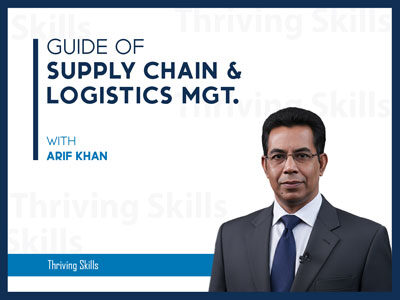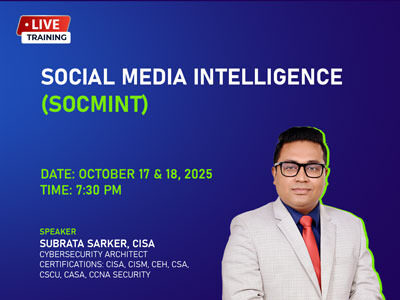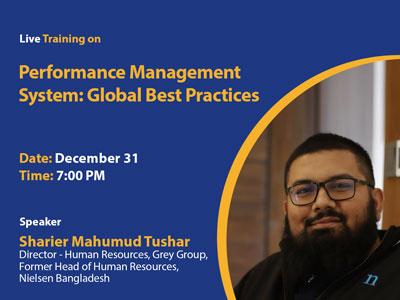Performance Management System: Global Best Practices
Performance Management System: Introduction: Managing employee performance facilitates the effective delivery of strategic and operational goals. There is a clear and immediate correlation between using performance management programs and improved business and organizational results. For that having a valid yet effective PM system is essential for managing and evaluating staff, developing their competencies, improving organizational performance, and eventually achieving winning business outcomes. This training examines the importance of an effective performance management system in helping organizations define and achieve short- and long-term goals. It explains and reinforces the concept that performance management is not a one-time supervisory event, but an …
Curriculum
- 1 Section
- 4 Lessons
- 204 Weeks
- Performance Management System: Global Best Practices4
Overview
Performance Management System:
Introduction:
Managing employee performance facilitates the effective delivery of strategic and operational goals. There is a clear and immediate correlation between using performance management programs and improved business and organizational results. For that having a valid yet effective PM system is essential for managing and evaluating staff, developing their competencies, improving organizational performance, and eventually achieving winning business outcomes. This training examines the importance of an effective performance management system in helping organizations define and achieve short- and long-term goals. It explains and reinforces the concept that performance management is not a one-time supervisory event, but an ongoing process of planning, facilitating, assessing, and improving individual and organizational performance. In addition, the training emphasizes the importance of measuring the effectiveness of human resource activities that are designed to enhance individual and organizational performance.
Training Objectives:
This interactive one-day training course will bring consistency in applying performance management within the business. The course will help managers and team leaders recognize their role and contribution to effectively manage performance and conduct at work. Through the trainer’s expertise and practical knowledge, participants will be able to define the key
Concepts associated with performance management and will be able to:
– Shared a common understanding on how performance management systems can be effectively utilized to raise the performance of individuals and teams.
– Enhanced their skills in setting clear expectations and objectively measuring individual performance using objectives and competencies as key measures.
– Identified and practiced some performance management strategies and techniques to enhance the performance and motivation in under-performing and high-performing team members.
– Develop an understanding of the principles of effective performance management.
– Develop an understanding of the best practice performance management processes.
– Comprehend the concepts of competency, management style, and organization climate as critical elements of the performance improvement process.
– Practically experience a number of the tools which are critical to the success of the new performance management process.
Training Contents:
What is Performance Management:
– The principles of effective performance management
– Overview of the best practice performance management process Planning Performance:
– Setting key performance objectives for individuals and teams
– Cascading the business plan down through the organization
– Understanding the competencies associated with effective job performance
– How to set training and development goals
Managing Performance:
– Monitoring and tracking performance
– Coaching and leveraging performance
– Diagnosis of management style preferences
– Diagnosis and exercise on situational management
Appraising Performance:
– Key issues for effective appraisal
– Video – performance review session
– Linking pay with performance Internal Vs. External Hires
– Performance Management Framework
– The importance of performance management
– Performance Planning: Organizational mission, strategy, and goals
– Creating a performance management culture through HR programs and practices
– Steps in Performance Management
– Performance planning process and employee performance
– Rewards and performance
– Designing jobs to enhance performance
– Performance assessment, including 360-degree feedback
– Performance improvement planning – identifying root causes
– Coaching and performance management
– Team management
– Progressive discipline
– Performance management system review and enhancement
– A perfect marriage: good people management & solid processes
– Managing the pipeline: Interviewing & Succession planning
Training Methodology:
– PowerPoint presentations
– Interactive Lectures, Handouts & Case studies
– Exercises with practical real-life examples, problems with solutions
– Group work; Sharing & Participatory
– Videos
– World’s Best Practices
– Open floor discussion Questions & Answers
Target Audience:
– Young Emerging & Potential HR Professional (any level)
– Line Manager & Team Leaders
– Senior Management People
– HR Consultants
– Students or Academicians involved in the HR study
– Corporate Professional
– Employees of other Functions
– Independent Entrepreneurs
– Recruitment enthusiastic
The “+” of the Training:
– Using innovative pedagogical methods
– Instructor lead the discussion for sharing experience
Note:
- After completing every lesson click on the “COMPLETE” button the go to the next lesson.
- Must set up your first name, last name, and display name from settings of your profile for your certificate.
- don’t click on the “FINISH COURSE” button.
- If you click on the “FINISH COURSE” button then the course will be finished and a Certificate will be generated.
- More details: https://thrivingskill.com/faqs/
Training Instructor:
Course and Training of this Instructor:







